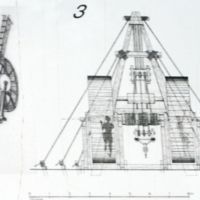Position of sign B. Quarry of Group C. Quarrying techniques, bindings, Counterweights, Cranes
Dublin Core
Title
Position of sign B. Quarry of Group C. Quarrying techniques, bindings, Counterweights, Cranes
Language
en
Identifier
ALK.20.01.02
Is Part Of
Point Item Type Metadata
Latitude
40.60179
Longitude
24.73899
MobileContent
From very early on, since the 3rd millennium BC, man used ramps to be able to lift heavy and bulky stones. In this way, imposing monuments were built, such as the megalithic monuments of prehistoric Europe, the pyramids of Egypt, the walls and the vaulted tombs of the Mycenaean world. However, the big breakthrough occurred in the 6th century BC, by the Greeks, who invented the pulleys, the hoists, the winches and the lifting machines. Modern lifting machines are nothing more than developments of these ancient inventions. The picture shows from the back side, the previous lifting machine with a human cage.
SpeechContent
From very early on, since the 3rd millennium BC, man,, used ramps to be able to lift heavy and bulky stones. In this way,, imposing monuments were built, such as the megalithic monuments of prehistoric Europe, the pyramids of Egypt, the walls and the vaulted tombs, of the Mycenaean world. However,, the big breakthrough occurred in the 6th century BC, by the Greeks, who invented the pulleys, the hoists, the winches, and the lifting machines. Modern lifting machines are nothing more than developments of these ancient inventions. The picture shows from the back side, the previous lifting machine, with a human cage.
Entrance
TextDuration
0:39
Files
Collection
Citation
“Position of sign B. Quarry of Group C. Quarrying techniques, bindings, Counterweights, Cranes,” iGuide Repo, accessed December 5, 2025, http://ubuntu01.ceti.gr/omeka/items/show/1807.
Item Relations
| This Item | dcterms:isPartOf | Item: Position of sign B. Quarry of Group C. Quarrying techniques, bindings, Counterweights, Cranes |

